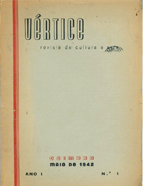

................................
This concept of the collective hero represents, more than a break with the past, the persistence of a voluntaristic idea of historical development. Mário Braga adopted it to understand the reasons for the different outcomes in 1383 and 1580. This difference did not lie in the idea of nationality, the role of the nobility, economic causes, or even the different balance of military forces on those two dates: “only an analysis of the actions of the people at one moment or the other will enable us to formulate an answer” (no. 80, Apr. 1950, 197-205).
In another sense, Vértice’s cultural project contributed to the affirmation of conceptions of history that were assumed to be scientific and associated with the ideas of rigour, truth and objectivity in the study of the past. As a result of the influence of Marxist ideas and the Annales, contingency and human initiative tended to be relativised or, from a more deterministic perspective, suppressed in historiographical interpretations. This was the case with António José Saraiva who, in a critique of António Sérgio’s idealism, definitively questioned any voluntarist idea in the study of the past: “The subject is determined to the extent that we know the object. Everything is therefore reduced to knowing the object”. The emphasis on the materialist nature of historical becoming sought to bring history closer to scientific methods and objectives: as long as ‘our subjective consciousness’ was removed from historiographical construction, man could be attributed ‘predictable behaviour, reducible to statistics’. (No. 81, May 1950, 279-288).
In another article, significantly entitled “Determinism and history”, António José Saraiva explored this idea further, stating that “explaining social phenomena, introducing the assumption of predictability into them, is ultimately reducing them to the laws of material determinism”. In this sense, historical knowledge not only enabled the diachronic identification of structural problems in societies, but also their future transformation, through the ability of historians to uncover the “laws” that conditioned human action, thus constituting “an instrument for accelerating progress” (nos. 99-101, Nov.-Jan. 1951-2, 572-3). In this theoretical framework, adopted in a more or less orthodox manner ( , depending on the historian), the concept of “historical laws” played a structuring role in historiographical interpretation, with its use in the pages of Vértice by several historians standing out.
This work is financed by national funds through FCT - Foundation for Science and Technology, I.P, in the scope of the projects UIDB/04311/2020 and UIDP/04311/2020.
